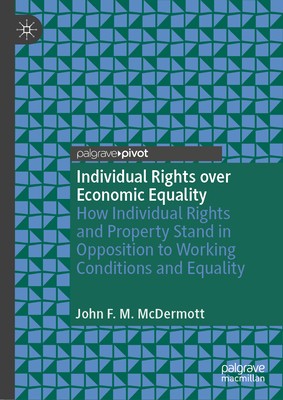
- We will send in 10–14 business days.
- Author: John F M McDermott
- Publisher: Palgrave Macmillan
- ISBN-10: 3031751027
- ISBN-13: 9783031751028
- Format: 16 x 21.5 x 1.5 cm, hardcover
- Language: English
- SAVE -10% with code: EXTRA
Reviews
Description
Since the mid-1960's, citizens' rights in the United States have improved across many areas, including race, gender, sexuality, physical disabilities, age, consumption of goods, voting, and more. During this time, there has also been a degradation in economic rights, such as economic equality. Is there a reason for this contradiction? Is it possible for American citizens to experience rights and equality?
At the center of natural rights theories lies the "inalienable" right to private property, and the concepts and practices of the accumulation of private property always defeat personal liberties. Current political philosophers espousing natural rights, including liberal John Rawls and conservative James M. Buchanan, share nearly identical premises and goals. The two sides do not often recognize that the free-standing individual at the center of mainstream theorizing in economics and politics simply does not exist. We are social animals, all embedded in (very unequal) networks of social and economic relations, requiring very different explanatory frameworks than those given by individual rights theorizing.
This book explores the ways the foundational ideology of individual rights belies the actualities of economic inequality. It argues that "individual rights" philosophy offers the main ideological basis for the astronomical accumulations of wealth that produce this inequality. Exploring the defects of rights theory, the book explores key concepts within social progress and economic stability. The resulting text presents and analyzes the networks of contemporary corporate, business, and financial power that structurally and systemically limit the lives and choices of citizens in the United States.
EXTRA 10 % discount with code: EXTRA
The promotion ends in 18d.06:53:34
The discount code is valid when purchasing from 10 €. Discounts do not stack.
- Author: John F M McDermott
- Publisher: Palgrave Macmillan
- ISBN-10: 3031751027
- ISBN-13: 9783031751028
- Format: 16 x 21.5 x 1.5 cm, hardcover
- Language: English English
Since the mid-1960's, citizens' rights in the United States have improved across many areas, including race, gender, sexuality, physical disabilities, age, consumption of goods, voting, and more. During this time, there has also been a degradation in economic rights, such as economic equality. Is there a reason for this contradiction? Is it possible for American citizens to experience rights and equality?
At the center of natural rights theories lies the "inalienable" right to private property, and the concepts and practices of the accumulation of private property always defeat personal liberties. Current political philosophers espousing natural rights, including liberal John Rawls and conservative James M. Buchanan, share nearly identical premises and goals. The two sides do not often recognize that the free-standing individual at the center of mainstream theorizing in economics and politics simply does not exist. We are social animals, all embedded in (very unequal) networks of social and economic relations, requiring very different explanatory frameworks than those given by individual rights theorizing.
This book explores the ways the foundational ideology of individual rights belies the actualities of economic inequality. It argues that "individual rights" philosophy offers the main ideological basis for the astronomical accumulations of wealth that produce this inequality. Exploring the defects of rights theory, the book explores key concepts within social progress and economic stability. The resulting text presents and analyzes the networks of contemporary corporate, business, and financial power that structurally and systemically limit the lives and choices of citizens in the United States.


Reviews